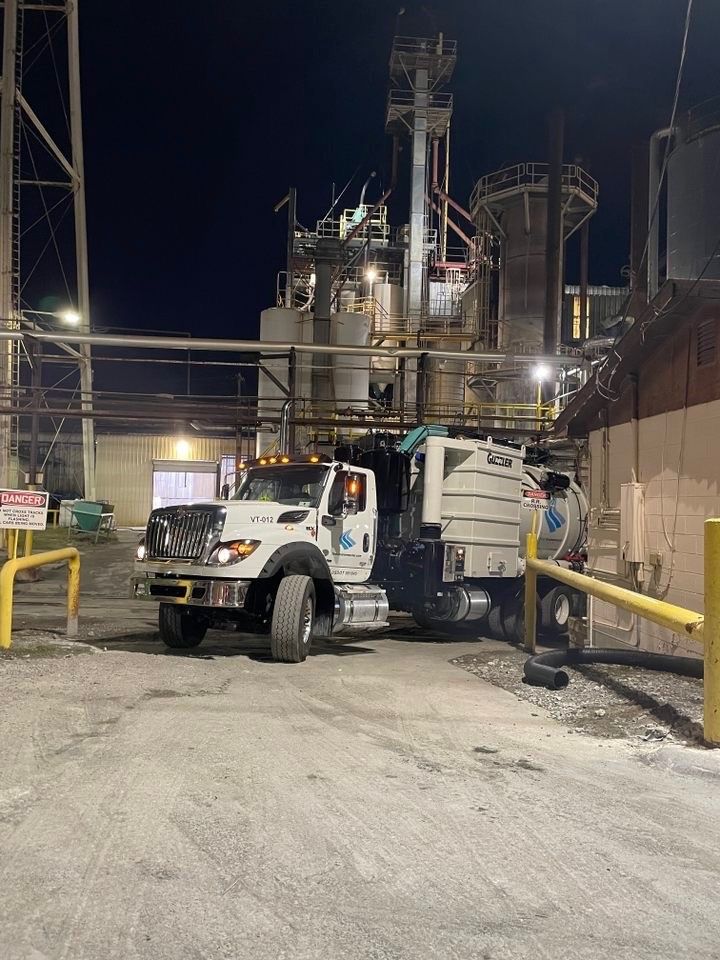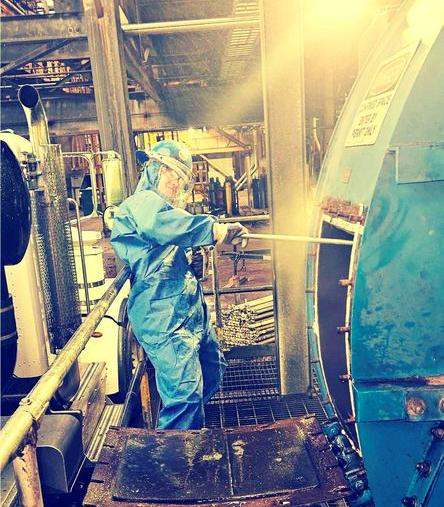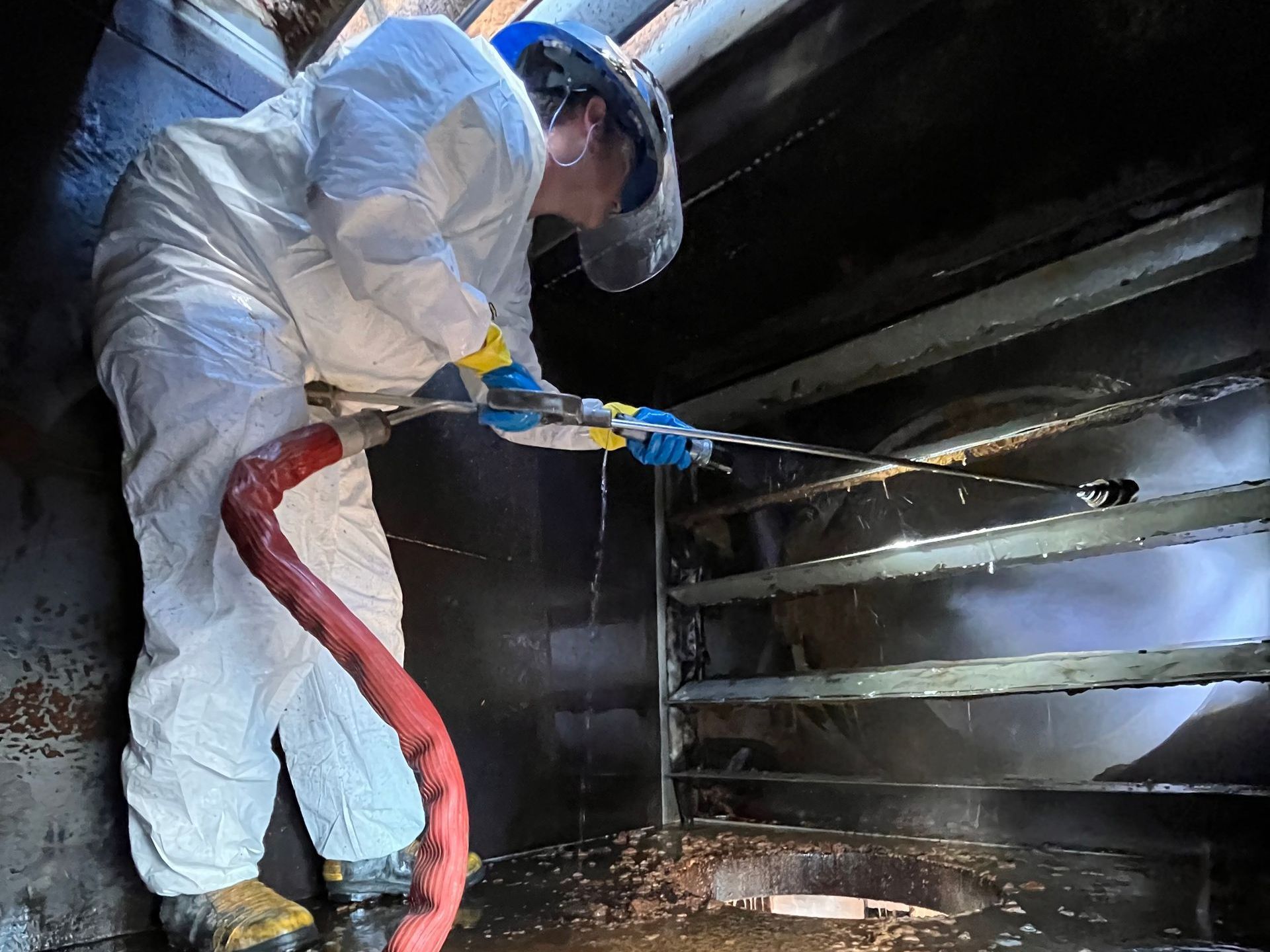Managing Waste
Managing Waste- An Overview
- When materials outlive their usefulness, they get discarded.
- At your residence, they go into the trash (or recycling). Household wastes are exempt from regulation (If you’ve seen H.H.W. events, they are in place to capture these hazardous wastes even though they aren’t regulated).
- At your place of business, they are regulated. This means they have to be evaluated before they get disposed of/recycled. Are they trash? Are they solid waste? Are they hazardous waste? Can/should they be recycled? Do they still have value as a product?
- Since we are primarily supporting businesses, that will be the focus of this discussion.
- This blog’s discussion will focus on waste management: non-hazardous, particular waste, and hazardous waste.
Waste Disposal 101- A Review Guide for Non-Haz Waste
How does your business handle its waste disposal practices? Your business needs a strategy to dispose of these materials safely and efficiently, from storage to transportation of waste products. At the same time, your business needs to comply with relevant state and federal regulations to ensure its disposal practices meet environmental safety standards.
This quick review guide will review everything you need to know about non-hazardous waste transportation and disposal. Here’s how to develop your business’s four-step waste disposal plan:
- Identification of Waste Byproducts: Industrial and commercial wastes come in all shapes and sizes. More importantly, every category of waste has specific characteristics that require careful evaluation and planning. The first step of a waste disposal strategy is to identify your business’s waste byproducts. For example, you need to determine whether your business is producing either hazardous wastes, non-hazardous wastes, or both. Depending on the type of waste your business generates, additional testing or other specialized procedures may be required.
- Waste Storage: Proper storage of waste products ensures that all hazardous and non-hazardous waste remains safe until disposal. Most non-hazardous waste can be stored in roll-off box containers. This storage equipment ensures that waste products are appropriately collected to minimize environmental exposure.
- Waste Transportation Services: Because your business does not dispose of its waste products on-site, the waste needs to be transported to a secure disposal facility (often called a treatment, storage, and disposal facility or “TSDF”). Waste transportation services ensure that waste products reach their proper endpoint destination. These services will retrieve the waste storage container from your premises and then deliver it to an approved disposal or TSDF facility.
- Waste Disposal or Treatment: The final step in non-hazardous waste management is disposal. The disposal of industrial and commercial wastes varies depending on the type of waste involved. While many wastes may be disposed of in landfills or incinerators, others require specialized long-term storage and containment. To understand specific disposal regulations, we recommend consulting a waste services professional in your area.
Hazardous vs. Non-Hazardous Waste: What’s the Difference?
To properly evaluate your business’s waste disposal protocols, you must understand the difference between hazardous and non-hazardous wastes. Our team of waste disposal professionals has created the following chart to help you know the difference.
E.P.A. Definitions
Hazardous Waste
40 C.F.R. § 243.101(n) defines hazardous waste as any “waste or combination of wastes of solid, liquid, contained gaseous, or semisolid form which may cause, or contribute to, an increase in mortality or an increase in serious irreversible, or incapacitating reversible illness, taking into account the toxicity of such waste, its persistence and degradability in nature, its potential for accumulation or concentration in tissue, and other factors that may otherwise cause or contribute to adverse acute or chronic effects on the health of persons or other organisms.”
Non Hazardous Waste
40 C.F.R. § 243.101(y) refers to non-hazardous waste as “…sludges, and other discarded solid materials, including solid waste materials resulting from industrial, commercial, and agricultural operations…” and from community activities but does not include solid or dissolved materials in domestic sewage or other significant pollutants in water resources, such as silt, dissolved or suspended solids in industrial wastewater effluents, dissolved materials in irrigation return flows or other common water pollutants.”
Categories of Waste
There are generally four characteristics associated with hazardous wastes: (a) ignitability, (b) corrosivity, (c) reactivity, and (d) toxicity.
Non-hazardous waste usually refers to residential, commercial, institutional solid wastes, and street wastes that are not ignitable, corrosive, reactive, or toxic.
Common Industries
Some of the largest producers of hazardous waste include dry cleaners, automobile repair shops, laboratories, pesticide users and manufacturers, textile manufacturers, and energy producers.
Nearly every business produces non-hazardous waste, from construction projects to general manufacturing.
How It’s Disposed
The E.P.A. has specific guidelines for hazardous waste disposal. These procedures vary depending on the classification or listing of the hazardous waste.
The most common method of disposal for non-hazardous waste is landfill disposal. Other methods may include composting, recycling, and incineration.
Common Types of Non-Hazardous Waste
- Agricultural Solid Waste: This group of waste refers to the natural byproducts of livestock harvesting and crop production. Agricultural solid waste may include animal manure, livestock feed, disposed of crop portions, and other residual wastes from agricultural operations. Agricultural solid waste is often produced by farms and food processing facilities.
- Construction and Demolition Waste: Large-scale commercial building projects involve vast amounts of waste products. Construction waste and demolition debris commonly include non-hazardous wastes: concrete, glass, wood, brick, sand, asphalt, nails, shingles, roofing components, drywall, and plastics. Every residential and commercial building project should have an efficient method for storing and transporting construction waste. Every developer and contractor must have a construction waste partner they can count on for safe and efficient disposal.
- Food Waste: Food waste refers to organic material used for the consumption, preparation, handling, and sale of food products. Restaurants, grocery stores, and hotels are some of the biggest producers of food waste byproducts. Food scraps and food waste result from expired or non-conforming products that must be disposed of to make room for new inventory. This type of non-hazardous waste is often stored in roll-off box containers.
- Residential Solid Waste: The average family throws away more than 6,500 pounds of waste every year. This waste refers to all sorts of residential solid wastes, including paper products, food scraps, plastic packaging, aluminum cans, glass bottles, cotton clothing, and yard trimmings. Most non-hazardous residential waste is retrieved by local or municipal services, though some residential activities (like interior renovations or outdoor landscaping) may require third-party waste services.
- Mining Waste: Certain mining byproducts resulting from the extraction of ores and other materials may be considered non-hazardous. Non-hazardous mining waste may include red and brown muds/clay, phosphate rock, and other excavated materials. Because the mining industry is highly regulated, our team recommends checking your disposal procedures with an environmental expert before confirming any single disposal strategy.
- Medical Waste: Some, but not all, medical waste is considered non-hazardous. As long as the medical waste is non-radioactive and non-surgical, the waste may be suited for non-hazardous disposal practices. According to the World Health Organization, 85% of all healthcare waste is non-hazardous. Non-hazardous medical waste includes products like plastic packaging, paper, gloves, masks, linens, and food supplies. Other types of medical waste (like tissue samples or surgical instruments) require specialized disposal procedures.
- Packaging Waste: Packaging waste is one of the most significant sources of non-hazardous waste. From cardboard boxes to plastic containers, packaging waste is one of the bulkiest and most common items found in non-hazardous waste.
- Timber Waste: The process of harvesting and manufacturing timber products creates a large amount of non-hazardous waste. Commonly discarded timber waste may include tree branches, sawdust, trim, leaves, bark, and other logging residues. A non-hazardous waste services company is often the most cost-effective solution to store and efficiently dispose of this material.
- Scrap Tires: Every year, Americans discard hundreds of millions of scrap rubber tires. These scrap tires can be recycled and repurposed for new uses (called “tire-derived products”), which may be used in construction materials, textiles, or other industries. To transport discarded scrap tires to a local recycling facility, contact your area’s local waste services company.
Understanding RCRA Regulations (Hazardous Waste)
The Resource Conservation and Recovery Act (RCRA) allows state and federal agencies to regulate and enforce waste disposal practices. The RCRA defines different types of wastes and how they should be appropriately stored, transported, and disposed of. The RCRA has technical classifications of hazardous wastes, explicitly listing the chemicals, compounds, and waste byproducts that require strict environmental oversight. When it comes to Georgia-specific regulations, it is also essential that your business understands the regulations promulgated by the Georgia Environmental Protection Division (EPD).
Every company should develop a comprehensive plan to deal with their business waste needs. Because disposal practices vary from industry to industry, every company needs a customized waste management solution that addresses the types of discarded materials, the recipient facility for the non-hazardous wastes, and the transportation needs for the quantity and quality of the waste materials. RCRA compliance is an essential component of safe environmental practices for every business.
To minimize the financial costs and environmental impacts of non-hazardous waste, the E.P.A. has prescribed four essential steps that every business can take to reduce their waste footprint. These steps include: (1) reducing and reusing source materials; (2) recycling and composting; (3) converting non-recyclable materials into energy sources through processes like combustion and landfill gas recovery; and (4) practicing safe treatment and disposal methods. These practices can not only save you money but can also reduce risk and promote environmental sustainability.
What is Special Waste and How is it Disposed of in Georgia?
Special waste refers to any class of waste that requires specialized disposal, transportation, storage, containment, or treatment. Though special wastes are not included in the E.P.A. list of hazardous wastes, they are still regulated at the local, county, and state levels to ensure proper disposal procedures. In Georgia, special wastes are usually controlled by the county or municipality where the waste production activity takes place or where the waste is later received. Under Georgia law, special wastes must be disposed of at specified “regional landfill or regional solid waste disposal facilities,” owned and operated by the county, city, regional authority, or special solid waste district.
Common Types of Special Waste in Georgia
- Asbestos: Produced from silicate mineral deposits, asbestos is a heat-resistant material previously used in construction, insulation, textiles, brake pads, adhesives, paint, tiling, and roofing. Though asbestos-based materials have been mostly phased out today, there are still thousands of buildings in Georgia with outdated asbestos materials. Because asbestos exposure is associated with long-term health conditions like mesothelioma, most counties require that this material meets special waste disposal procedures.
- Cement Kiln Dust: Cement kiln dust (sometimes abbreviated as “CKD”) is particulate matter produced during the cement manufacturing process. The composition of cement kiln dust varies between cement manufacturers, with different concentrations of calcium oxide, magnesium oxide, calcium sulfate, and other compounds. Because cement kiln dust has high alkalinity, most cities and counties take technical measures to prevent CKD exposure in waterways, sewers, and runoff.
- Contaminated Soil: Petroleum-contaminated soil (sometimes abbreviated as “P.C.S.”) results from gasoline, oil, kerosene, or diesel fuel contamination of soil. High concentrations of petroleum-contaminated soil may result from pipeline leaks, shipping or transportation accidents, and leaking storage tanks. Because petroleum-contaminated soil is associated with health complications and soil degradation, this material must be safely transported to a special waste disposal facility.
- Fossil Fuel Combustion Waste: Energy generated from burning fossil fuels, like coal and natural gas, produces waste byproducts called fossil fuel combustion waste (sometimes abbreviated as “F.F.C. waste”). Coal combustion by energy providers and utility companies produces large amounts of coal ash byproducts, including bottom ash, fly ash, and boiler slag. Fossil fuel combustion waste contains high concentrations of mercury, lead, chromium, and arsenic that can be dangerous to human health. This waste must be stored, transported, and disposed of in compliance with all local, state, and federal regulations.
- Industrial Sludge & Commercial Sludge: Industrial and commercial sludge may refer to any number of environmental contaminants like sewage sludge, concrete grinding sludge, wastewater sludge, petroleum sludge, and drain or sump sludge. Industrial sludge is a common waste byproduct in many industries, including the automotive industry, paint/coatings industry, and pulp and paper industry. Depending on the characteristics of this material, this category of waste often requires special waste transportation and disposal.
- Mining Waste & Mineral Processing Waste: The extraction and processing of minerals/ores produce large amounts of waste byproducts. Common special wastes in the mining industry include copper slag, lead slag, process wastewater, and leaching chemicals. This category of particular waste must comply with relevant waste disposal regulations in your area.
Understanding Special Waste Rules in Your Area
It is essential that you understand the particular waste disposal rules that affect your business. We always recommend contacting your local waste disposal division to understand how your business may be affected by special waste disposal regulations. Some counties and municipalities may require testing procedures to determine the chemical makeup of certain special wastes and the corresponding disposal procedures.
To safely deal with your special waste, your business should develop the following three-step waste management plan:
- Storage: To prevent environmental contamination, special wastes must be adequately contained in secure locations. Special waste storage systems may include roll-off box containers, tanks, drums, and other secure containers. Many regulatory authorities also require that special waste storage containers be labeled appropriately and that the materials be transported within a certain period of time.
- Transportation: Moving special wastes from one location to another is no easy task. The process of transporting special wastes requires specialized equipment to minimize the chances of leaks or other errors. Special waste transportation ensures that your waste transportation needs are left in the hands of professionals, who can set up all the logistics and deliver the waste to the correct disposal facility.
- Disposal and Treatment: The final step of a comprehensive waste management system is disposal. Disposal procedures are usually handled by public or governmental agencies that process, recycle, treat, or dispose of special wastes. Because special waste disposal requires additional handling and processing, many cities and counties charge additional fees for special waste disposal.
What Can Your Business Do?
Consult a waste services professional today to evaluate your business waste needs. First Environmental serves the Southeast with offices in Atlanta, Macon, and Brunswick, offering professionally managed waste services. First Environmental provides a wide range of waste services, including non-hazardous waste transportation using our state-of-the-art vacuum trucks, box cleaning, box washing,
tank cleaning service and equipment transportation. First Environmental has extensive experience with hazardous waste management and can provide solutions for your most challenging problems.





